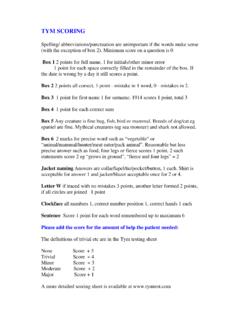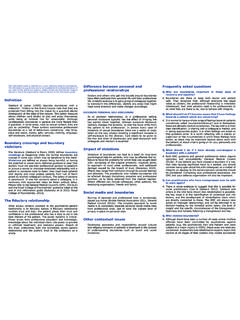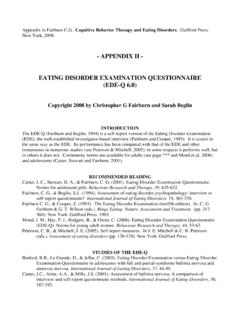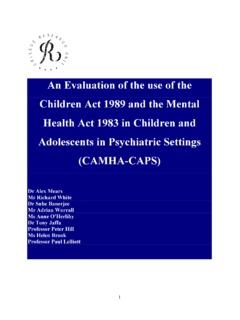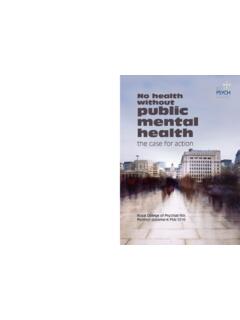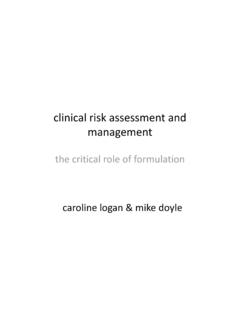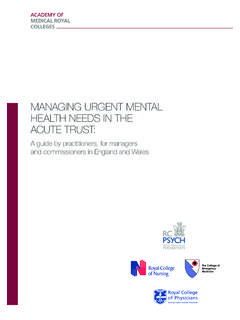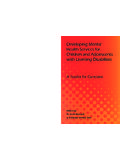Transcription of SSCS1A - How to appeal against a decision made by the ...
1 SSCS1A . How to appeal against a decision made by the Department for Work and Pensions 3. Contents 1. About this guide 4. 2. What to consider 5. 3. Making your appeal 6. 4. Completing form SSCS1 8. 5. Completing form SSCS2 16. 6. After you send in your appeal 17. 7. What will DWP do with your appeal ? 18. 8. After DWP has made their response 19. 9. Preparing for the tribunal hearing 21. 10. Keeping in touch 23. 11. Attending your hearing 24. 12. After the tribunal has made its decision 28. 4. 1. About this guide The aim of this guide is to help you if you wish to appeal against a decision made by the Department for Work and Pensions (DWP). An appeal ' means applying to Her Majesty's Courts & Tribunals Service (HMCTS) for an independent ruling as to whether a decision by DWP is correct or not. your appeal can be considered by a tribunal which belongs to the system of courts and tribunals which decide people's rights.
2 The tribunal deals with disputes about social security benefits and child maintenance. It makes an independent decision on appeals in most cases by means of a hearing. About DWP's decisions DWP is changing the way it makes decisions and the way that you make an appeal depends on the type of decision you have received. The information given in this guide applies to appeals against decisions made regarding the Personal Independence Payment and Universal Credit and, from 28 October 2013, to all other DWP decisions with a right of appeal . If your decision does not relate to the Personal Independence Payment or Universal Credit and the letter is dated before 28 October 2013, you should follow a different process and the appeal should be made by using a different form and sent to a different address. Information on how to do this is not provided in this guidance booklet.
3 To find out more about the process, you should obtain DWP's leaflet GL24 If you think our decision is wrong' and use the appeal form provided with it. The guidance given in the leaflet will tell you how to start you appeal . You can obtain a copy of a GL24 form from Jobcentres or you can download a copy from This guidance booklet can explain to you only what happens once HMCTS receive your appeal , but the instructions given on how to make the appeal , which form to use and where to send it are not for you and you should not use them. If your decision relates to the Personal Independence Payment or Universal Credit or is dated 28 October 2013 or later, you should use the guidance provided in this booklet to make your appeal . The information provided here applies to appeals against decisions you have already asked DWP to reconsider and for which they have provided you with a Mandatory Reconsideration Notice.
4 This is the letter from DWP telling you they have reconsidered their decision . It may also apply to a decision made by DWP regarding a dispute which had already resulted in an appeal . 5. 2. What to consider Can I appeal ? You can only appeal where the law gives you a right of appeal . Not every decision made on social security benefits or child maintenance assessments carries a right of appeal . When you get an official letter giving a decision , it must say whether you have a right of appeal against that decision . This is a legal requirement placed upon the Department for Work and Pensions. As a broad guide, decisions on whether you are entitled to benefit, or liable to receive or pay child maintenance, and if so, how much, do carry a right of appeal . Decisions about administrative matters, such as how or when you might get paid, do not carry a right of appeal . your letter should state clearly whether you have the right of appeal .
5 If, however, the decision letter says you do not have a right of appeal , but you think that DWP have made a mistake and you should have the right of appeal , you can send your appeal to HMCTS and get a legal ruling as to whether there is a legal right to hear your case. You may want to discuss this issue with DWP first. If you do this, you must make it clear in the grounds for your appeal that you believe that you have the right of appeal and why you have that right. This will allow HMCTS to identify your point of dispute and take the necessary action. If the tribunal rules that you do have a right of appeal , the appeal can go ahead. If, on the other hand, the tribunal rules that you do not have the right to appeal against that decision (that is, your appeal is out of jurisdiction'), your appeal ends there. These types of cases are unusual and it is best to seek advice from someone with knowledge or experience to make sure you are correct.
6 Should I appeal ? This guide deals with how to appeal . It cannot tell you whether you have a good case or not. HMCTS staff will be happy to help with telephone queries about your appeal as it goes through the process, but they cannot give you an opinion about whether you are likely to win or lose, or whether you should take a particular step or not. This is a decision for you. You may be able to get advice on whether you have a good case from a Citizens Advice Bureau, welfare rights service, advice centre, law centre, solicitor or trade union. Some may be willing to help you prepare your case and attend the tribunal hearing with you. You can find out about sources of help from: Yellow Pages;. Local council information services;. Many people who appeal choose to get professional advice and support with it. If you do decide to get advice, please do so at the earliest opportunity when you are thinking about appealing.
7 Please do not leave it until your appeal is well under way. 6. If you face a delay in getting advice (busy advice centres may not be able to give you an appointment straightaway), please make a note of the time-limit for appealing (see section Is your appeal in Time?). If the time limit is imminent, you should not delay making your appeal while you are seeking advice. In deciding whether to appeal or not, you also need to know what the tribunal can and can't do for you. Tribunals do not have unlimited powers. They can only do what the law gives them power to do. Basically, they have the power to decide whether you are legally entitled to social security benefits, or liable to pay or receive child maintenance. They may also decide whether benefit paid to you by mistake is recoverable from you. They can replace the decision you are appealing against with the decision they judge should have been rightly made.
8 Please bear in mind that the tribunal may also uphold the decision made by DWP or sometimes might make a decision which could leave you worse off. The Tribunal cannot: Change the law. The tribunal has to apply the law as it stands, even if that leads to an outcome that you think is unfair; or, Deal with administrative complaints, like delay or lack of courtesy. If you think you have received a poor service from DWP, you should take that matter up with their customer services. 3. Making your appeal The Law The law has certain rules about appeals and HMCTS can only accept your appeal if it meets these legal criteria. your appeal must: Be made in writing;. Be in English or Welsh;. Include with it a copy of the mandatory reconsideration notice;. Give reasons for the appeal ; and, Be signed by you, unless DWP or a court has appointed someone else to act on your behalf.
9 If your appeal does not meet all these criteria HMCTS may have to return it to you and may not be able to consider your appeal at all unless you provide these details. Because of the legal requirement to include specific information HMCTS strongly recommend that you use an appeal form to make your appeal . The form helps you gather the right information in a step-by-step way and has a checklist you can use to make sure that everything is included. Details of where you may obtain this are provided overleaf and on the Justice website. 7. The form also asks you questions about what type of hearing you would like, dates you would like us to avoid and whether you have any special needs. If you prefer, you can still make your appeal just by writing a letter, but you risk missing out some of the information the law requires. Also, HMCTS may have to write out to you separately to ask about your hearing requirements and availability and this creates a delay in the process.
10 If you want to appeal by writing your own letter, use the appeal form as your guide and include in your letter all the things that the appeal form asks for. Time-limits For social security and child support appeals you have one calendar month from the date when the Mandatory Reconsideration Notice was sent to you in which to appeal . your appeal is not regarded as made, until it has been received by HMCTS. For example, if the letter giving the decision is sent to you on 15 March, your appeal must arrive in HMCTS by 15 April at the latest. If you find yourself outside the time-limit, you must give reasons why the appeal is late. If you do not provide reasons your appeal may be returned to you. There is a special section on the appeal form where you can give reasons for lateness. Please remember, if the time limit is very soon your appeal may be late by the time it arrives in HMCTS, even if it is not late on the day you post it.

